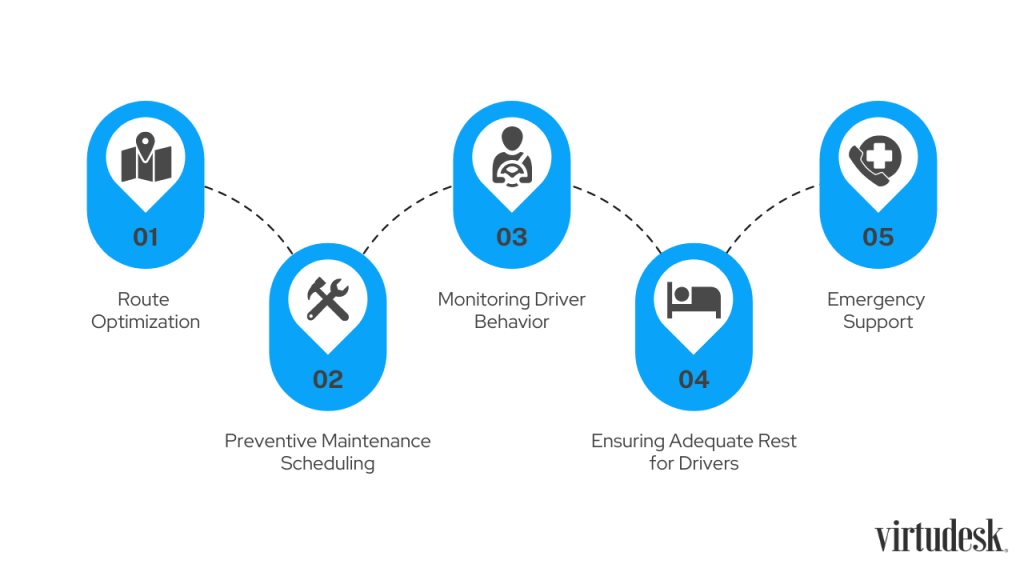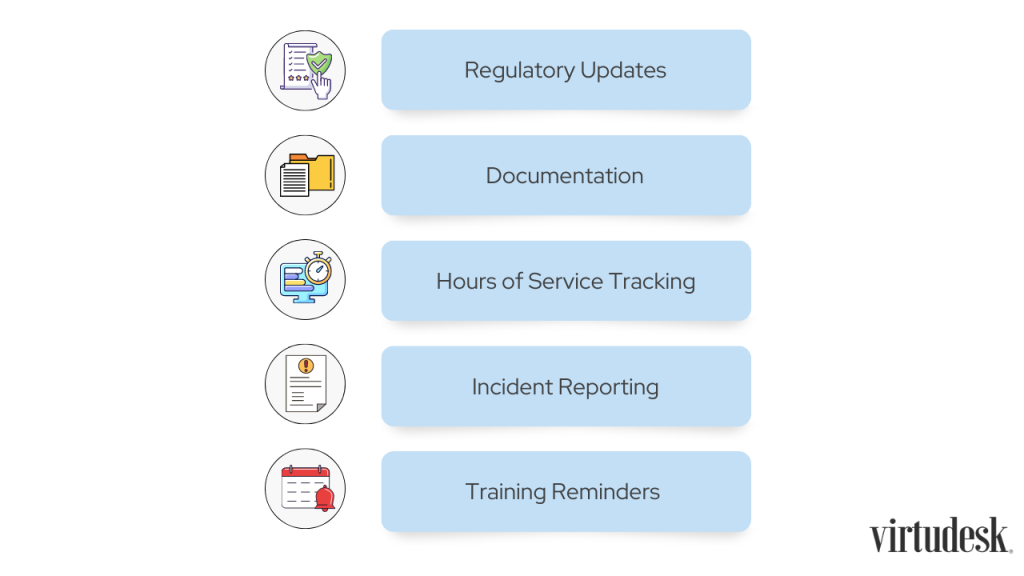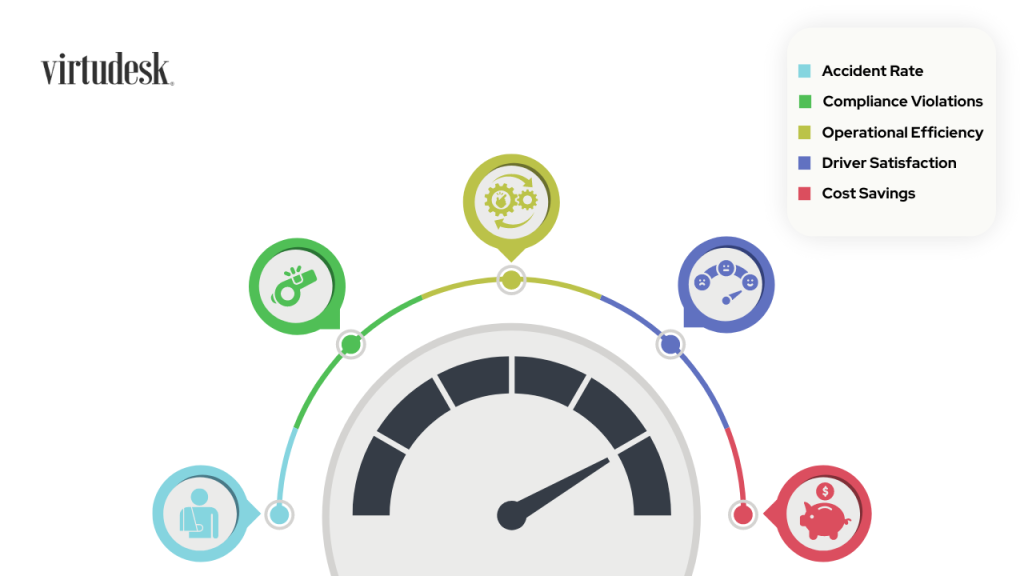The Impact of Virtual Assistants on Driver Safety and Compliance
In today's world, the trucking and logistics industry is becoming increasingly complex. With rising demands for speedy delivery, evolving compliance regulations, and the persistent need for enhanced driver safety, the industry is ripe for innovation.
One such innovation is the use of virtual assistants—professionals who offer indispensable support and services from a remote location. These professionals, armed with knowledge in the trucking industry, digital tools, and a commitment to excellence, are revolutionizing the ways in which driver safety and compliance are managed.
This comprehensive blog post takes a deep dive into the ways that virtual assistants contribute to driver safety, ensure compliance, how to choose the right virtual assistant, and the metrics for assessing their impact on your operations.
Virtual Assistants and Driver Safety
Safety is paramount in the trucking industry, and with the added support of virtual assistants, drivers can focus more on the road and less on peripheral tasks. Here's a detailed analysis of how virtual assistants enhance safety:
1. Route Optimization
Using the latest mapping technologies and real-time traffic data, virtual assistants can strategize the safest and most efficient routes for drivers. This proactive planning can help drivers avoid areas with heavy traffic, construction, or historically high accident rates, thus enhancing safety while also saving time and fuel.
2. Preventive Maintenance Scheduling
Vehicle breakdowns can cause safety hazards and unwanted delays. By scheduling regular maintenance checks, virtual assistants ensure that vehicles are in peak operating condition. They can organize these checks around driver schedules and route plans to minimize downtime, contributing to both safety and efficiency.
3. Monitoring Driver Behavior
With the advancement of telematics systems, virtual assistants can help monitor a driver's behavior on the road, including their speed, braking patterns, cornering, and idle time. They can provide drivers with regular feedback based on this data, helping encourage safer driving habits and prevent potential incidents.
4. Ensuring Adequate Rest for Drivers
Driver fatigue is a significant safety concern in the trucking industry. Virtual assistants can monitor driving hours in real-time, ensuring compliance with Hours of Service regulations designed to prevent fatigue. They can also assist in planning rest breaks in safe and convenient locations, further enhancing driver safety and well-being.
5. Emergency Support
Emergencies can occur at any time, and when they do, swift action is crucial. Virtual assistants can provide instant support, such as contacting emergency services, coordinating roadside assistance, notifying key stakeholders, and aiding in emergency route adjustments. By reducing response time and coordinating the necessary support, they can help mitigate the impact of the emergency.

Virtual Assistants and Driver Compliance
Ensuring regulatory compliance in a constantly changing legal landscape can be challenging, but with a virtual assistant, it doesn't have to be. Here's a detailed exploration of how virtual assistants enhance compliance:
1. Regulatory Updates
With new rules and amendments being introduced frequently, staying up-to-date with regulatory changes can feel like a full-time job. Virtual assistants can help by monitoring relevant channels for updates, interpreting how they impact your operations, and providing guidance on implementing necessary changes.
2. Documentation
Proper documentation is a crucial part of compliance. Virtual assistants can manage a wide array of critical documents, from driver's licenses and vehicle registration documents to insurance policies and cargo documentation. By ensuring all documents are up-to-date, accessible, and stored securely, they can reduce the risk of compliance issues.
3. Hours of Service Tracking
Compliance with Hours of Service (HOS) regulations is essential to avoid penalties and ensure driver safety. Virtual assistants can monitor driver hours in real-time and alert drivers or managers when they're approaching their limit, helping ensure adherence to these rules.
4. Incident Reporting
Should an incident occur, it's critical to document and report it correctly. Virtual assistants can facilitate timely and accurate incident reporting by compiling necessary details, preparing reports, and submitting them to relevant authorities, ensuring all regulatory requirements are met.
5. Training Reminders
Regular training is a requirement under many trucking regulations. Virtual assistants can help keep track of each driver's training status, schedule sessions, and send reminders, ensuring no training requirements are overlooked.

Choosing a Virtual Assistant for Safety and Compliance
Selecting the right virtual assistant is a crucial step. Here are seven key factors to consider:
1. Industry Experience
A virtual assistant with a deep understanding of the trucking and logistics industry, as well as its unique challenges, can provide valuable insights and strategies. This industry-specific experience enables them to offer tailored solutions and advice.
2. Service Scope
The range of services offered by a virtual assistant should match your needs. From route planning to regulatory monitoring and from maintenance scheduling to emergency support, they should be able to handle all your safety and compliance requirements.
3. Technology Integration
The virtual assistant should be adept at using the technologies and software systems that your operations rely on. This proficiency ensures seamless integration into your operations, allowing you to make the most of your existing systems.
4. Reliability
Reliability is non-negotiable. A proven track record of reliability ensures that the virtual assistant will be there when you need them, providing consistent, high-quality support.
5. Customer Support
Excellent customer support is crucial. Whether it's a question about regulatory changes, an issue with a report, or a need for emergency support, your virtual assistant should be available and responsive when you need them.
6. Privacy and Security
As the virtual assistant will handle sensitive information, it's crucial to ensure they have stringent privacy and security measures in place. These measures protect your information and ensure compliance with data protection regulations.
7. Cost
Consider the cost of the virtual assistant services against the value they offer. The cost savings from enhanced efficiency, improved safety, and reduced compliance violations can often outweigh the cost of the services.

Measuring the Impact of Virtual Assistants
Measuring the impact of your virtual assistant is crucial to understand the value they bring. Here are key performance indicators (KPIs) you should consider:
1. Accident Rate
A decrease in the accident rate could indicate improved safety, which is a testament to the effectiveness of the virtual assistant.
2. Compliance Violations
A reduction in compliance violations suggests that the virtual assistant is effectively ensuring regulatory compliance, highlighting their value to your operations.
3. Operational Efficiency
Improved delivery times, reduced vehicle downtime, and better fuel efficiency are all signs of increased operational efficiency, which can be attributed to the work of the virtual assistant.
4. Driver Satisfaction
Feedback from drivers can provide valuable insight into how well the virtual assistant is performing. Higher driver satisfaction can lead to better retention and productivity rates.
5. Cost Savings
Quantifying cost savings resulting from enhanced efficiency and reduced violations can help justify the cost of virtual assistant services.

In a world that is becoming increasingly digital, the benefits of employing a virtual assistant in the trucking and logistics industry are numerous. From enhanced safety to improved compliance, their role in supporting drivers and businesses is invaluable.
By choosing the right virtual assistant and measuring their impact, you can optimize your operations and secure a competitive edge in this dynamic industry. It is safe to say that virtual assistants, with their unique blend of skills and the power of technology, are driving the future of the trucking industry.
When you are ready to have a virtual assistant, please fill out this form and one of our Consultants will be in touch.
More Articles From Virtudesk
Share this article
Meet our Most Trusted
Partners & Clients

Byron Lazine
Co-Founding Chief-of-Operations at BAM (Broke Agent Media)I’ve been using Virtual Assistants for years throughout all of my companies. Once we found Virtudesk the process got even easier and allowed us to scale out our hiring. Highly skilled and accountable professionals. 100% recommend!

Rebecca Julianna James
Realtor / Content CreatorBefore getting started with Virtudesk I had my doubts that they would find what I was looking for. I needed a very particular person to add to my team and let me tell you I am highly pleased! My virtual assistant Myril is the best! I am excited to grow my socialmedia accounts with her. Thank you Virtudesk!

Chelsea Erickson
Realtor La Belle RE GroupI am very happy with the assistance Virtudesk is providing for my real estate business. This is a newer position for my company and we are working through the creation and efficiency.















